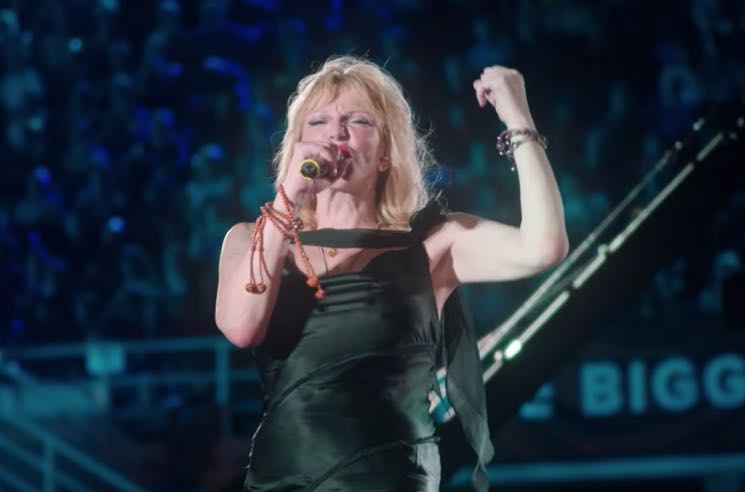Earlier this week, Courtney Love had some choice words for the Rock and Roll Hall of Fame's perpetuation of the music industry's blatant misogyny. The musician had a few additional characters to put toward her point, it seems, as she's now expanded her thoughts in a new op-ed for The Guardian, titled "Why are women so marginalized by the Rock and Roll Hall of Fame?"
To answer the question, Love hypothesizes that women making up only 61 of the 719 inductees — less than nine percent — since the Rock Hall was founded in 1983 probably has something to do with who decides which artists get nominated for induction. "Of the 31 people on the nominating board, just nine are women," she wrote, citing music historian Evelyn McDonnell's finding that men account for 90 percent of the industry elites, musicians and the like among voters.
"You can write the Rock Hall off as a 'boomer tomb' and argue that it is building a totem to its own irrelevance," Love continued. "But as scornful as its inductions have been, the Rock Hall is a bulwark against erasure, which every female artist faces whether they long for the honour or want to spit on it."
She went on to aptly refer to it as a "king-making force" in the global music industry, which affects inductees' ticket prices, performance guarantees and reissue campaigns. "Particularly for veteran female artists, induction confers a status that directly affects the living they are able to make. It is one of the only ways, and certainly the most visible, for these women to have their legacy and impact honoured with immediate material effect."
The singer-songwriter sees the Rock Hall's exclusion of women, Black artists and other artists of colour as beyond mere "sexist gatekeeping," going so far as to accuse the institution of "purposeful ignorance and hostility," citing one of this year's voters telling Vulture in an interview that they barely knew who Kate Bush was — despite her having an inescapable No. 1 song last year.
Love also referenced this week's timely return of the "Is Meg White a good drummer?" discourse online, writing, "you sense that if voters could get Jack White in without her, they would do it today."
She concluded the piece by calling for a complete overhaul of the Rock and Roll Hall of Fame's voting process, and said that, otherwise, it can "go to hell in a handbag."
Love revealed in an Instagram post that The Guardian "censored" her essay, removing a line where she apparently described the Rock Hall's governing board as "made up of music's most malevolent, a virtual black hole of the hellish." She also claimed that she never used to word "marginalized" about women, who make up 51 percent of the world's population (including her editor for this piece, apparently).
See the musician's post below.
To answer the question, Love hypothesizes that women making up only 61 of the 719 inductees — less than nine percent — since the Rock Hall was founded in 1983 probably has something to do with who decides which artists get nominated for induction. "Of the 31 people on the nominating board, just nine are women," she wrote, citing music historian Evelyn McDonnell's finding that men account for 90 percent of the industry elites, musicians and the like among voters.
"You can write the Rock Hall off as a 'boomer tomb' and argue that it is building a totem to its own irrelevance," Love continued. "But as scornful as its inductions have been, the Rock Hall is a bulwark against erasure, which every female artist faces whether they long for the honour or want to spit on it."
She went on to aptly refer to it as a "king-making force" in the global music industry, which affects inductees' ticket prices, performance guarantees and reissue campaigns. "Particularly for veteran female artists, induction confers a status that directly affects the living they are able to make. It is one of the only ways, and certainly the most visible, for these women to have their legacy and impact honoured with immediate material effect."
The singer-songwriter sees the Rock Hall's exclusion of women, Black artists and other artists of colour as beyond mere "sexist gatekeeping," going so far as to accuse the institution of "purposeful ignorance and hostility," citing one of this year's voters telling Vulture in an interview that they barely knew who Kate Bush was — despite her having an inescapable No. 1 song last year.
Love also referenced this week's timely return of the "Is Meg White a good drummer?" discourse online, writing, "you sense that if voters could get Jack White in without her, they would do it today."
She concluded the piece by calling for a complete overhaul of the Rock and Roll Hall of Fame's voting process, and said that, otherwise, it can "go to hell in a handbag."
Love revealed in an Instagram post that The Guardian "censored" her essay, removing a line where she apparently described the Rock Hall's governing board as "made up of music's most malevolent, a virtual black hole of the hellish." She also claimed that she never used to word "marginalized" about women, who make up 51 percent of the world's population (including her editor for this piece, apparently).
See the musician's post below.
